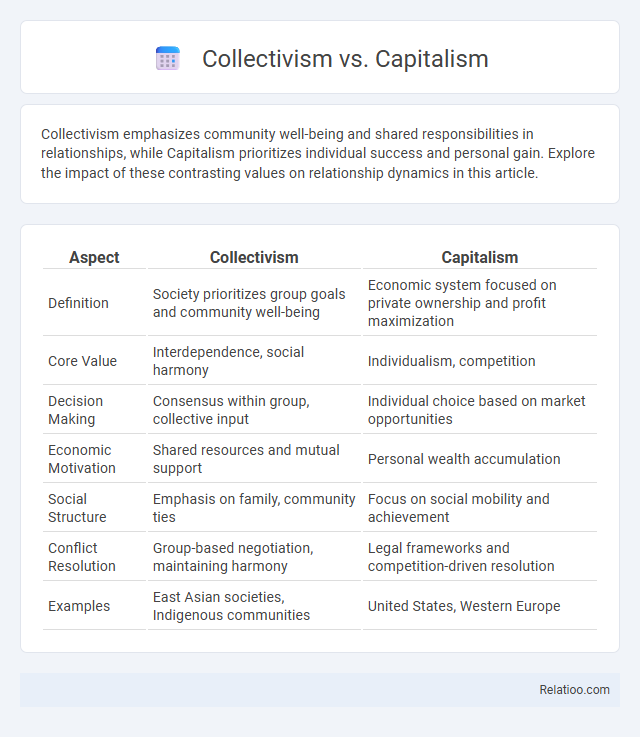Collectivism emphasizes community well-being and shared responsibilities in relationships, while Capitalism prioritizes individual success and personal gain. Explore the impact of these contrasting values on relationship dynamics in this article.
Table of Comparison
| Aspect | Collectivism | Capitalism |
|---|---|---|
| Definition | Society prioritizes group goals and community well-being | Economic system focused on private ownership and profit maximization |
| Core Value | Interdependence, social harmony | Individualism, competition |
| Decision Making | Consensus within group, collective input | Individual choice based on market opportunities |
| Economic Motivation | Shared resources and mutual support | Personal wealth accumulation |
| Social Structure | Emphasis on family, community ties | Focus on social mobility and achievement |
| Conflict Resolution | Group-based negotiation, maintaining harmony | Legal frameworks and competition-driven resolution |
| Examples | East Asian societies, Indigenous communities | United States, Western Europe |
Understanding Collectivism: Core Principles
Collectivism emphasizes the importance of group goals, social equality, and shared ownership of resources, contrasting sharply with capitalism's focus on individual profit and private property. Core principles of collectivism include cooperation, collective decision-making, and prioritizing community well-being over personal gain. This ideology seeks to reduce economic disparities by ensuring that wealth and power are distributed more equitably among all members of society.
Defining Capitalism: Key Features
Capitalism is an economic system characterized by private ownership of the means of production, market-driven economies, and profit maximization. Key features include competitive markets, capital accumulation, wage labor, and minimal government intervention. This contrasts with collectivism, which emphasizes shared ownership, social welfare, and centralized planning to achieve economic equality.
Historical Roots of Collectivism and Capitalism
Collectivism traces its historical roots to communal societies and early socialist movements emphasizing shared ownership and group welfare, emerging prominently during the Industrial Revolution as a response to capitalist inequalities. Capitalism developed from mercantile practices in Renaissance Europe, evolving through the Industrial Revolution into a system valuing private property, individual entrepreneurship, and market competition. Your understanding of these ideologies benefits from recognizing how historical contexts shaped collectivism's focus on social equity versus capitalism's drive for economic growth and personal wealth accumulation.
Economic Structures: Collective Ownership vs Private Enterprise
Economic structures under collectivism emphasize collective ownership where resources and means of production are owned and managed by the community or state, aiming to reduce inequality and promote shared benefits. In contrast, capitalism is characterized by private enterprise, where individuals or corporations own capital and operate businesses for profit, fostering competition and innovation. This fundamental difference impacts wealth distribution, economic incentives, and the role of government in market regulation.
Social Impact: Community Welfare vs Individual Achievement
Collectivism emphasizes community welfare by promoting shared resources and social equality, which often leads to strengthened social bonds and reduced economic disparities. Capitalism focuses on individual achievement, driving innovation and personal wealth accumulation but can result in social stratification and unequal access to opportunities. The tension between these systems shapes societal outcomes, where collectivism fosters social cohesion while capitalism encourages economic mobility through competition.
Political Systems Shaped by Collectivism and Capitalism
Political systems shaped by collectivism prioritize communal ownership, social welfare, and state intervention to promote equality and address collective needs, often manifesting in socialism or communism. Capitalism-driven political systems emphasize private property, market freedom, and minimal government interference, fostering competition and individual economic rights within democratic or republican frameworks. The tension between collectivist and capitalist principles influences policy-making, governance structures, and societal priorities in diverse political environments worldwide.
Innovation and Productivity in Both Models
Capitalism drives innovation and productivity through competitive markets, incentivizing individual entrepreneurship and investment, which often leads to rapid technological advancements and efficient resource allocation. Collectivism prioritizes shared ownership and collaboration, which can foster inclusive innovation aimed at long-term social benefits but may encounter challenges in motivating individual initiative and optimizing productivity. Hybrid models attempt to balance these approaches by integrating collective goals with market mechanisms, promoting sustainable innovation while maintaining economic efficiency.
Wealth Distribution and Social Equality
Wealth distribution in collectivism emphasizes equitable sharing of resources to reduce social inequality, ensuring that Your community's basic needs are met regardless of individual contribution. Capitalism promotes wealth accumulation based on market competition, often resulting in significant income disparities and social stratification. Comparing these systems highlights collectivism's priority on social equality, while capitalism favors personal wealth and economic freedom.
Challenges and Criticisms of Collectivism and Capitalism
Collectivism faces challenges such as inefficiency due to lack of individual incentives, bureaucratic overhead, and potential suppression of personal freedoms, which critics argue stifles innovation and economic growth. Capitalism is criticized for creating wealth disparities, fostering monopolies, and prioritizing profit over social welfare, leading to exploitation and environmental degradation. Both systems grapple with balancing individual rights and societal needs, often facing debates about optimal resource distribution and the role of government intervention.
Future Trends: Evolving Dynamics Between Collectivism and Capitalism
Emerging future trends indicate a complex interplay between collectivism and capitalism, where hybrid economic models incorporating social welfare and market efficiency are gaining momentum. Technological advancements and increasing social awareness drive the demand for sustainable capitalism infused with collectivist values such as shared ownership and community-oriented development. Predictive analyses suggest these evolving dynamics will redefine economic policies, balancing individual profit motives with collective societal benefits in the coming decades.

Infographic: Collectivism vs Capitalism
 relatioo.com
relatioo.com